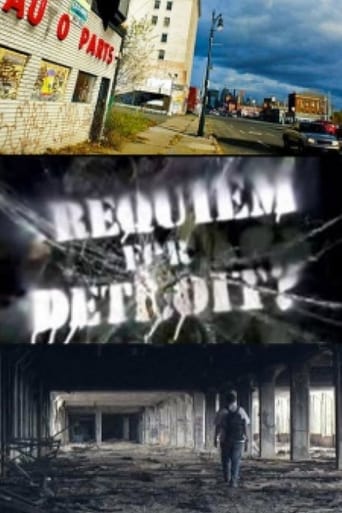BadlandZ
I wanted to like this documentary, because it was a great topic (the city) and it really pulled up a lot or research, interviews, footage, and history. It has a title that tells a story in itself, and it is about a city with a story to tell. And, any scene taken in isolation seems really good. It's how it was put together that is a mess.And wow, what a mess this documentary is… (there is not polite word for it) it is a cluster#**k of a story. They took some decent narratives by the people they interviewed, and dropped completely random footage, music, and history over the top of it in no order what-so-ever.If there is any "order" to this mess, it is "things were good, it's bad now. Things were bad, it's bad now. Things were good, it's bad now." If ending with "it's bad now" tells a story, I guess? But, they told this story so horribly, they jumped right from "Paris of the Midwest" to "race riots" to "high center of fashion in the US and children safe an no one had to watch them" without ANY transitions… Just giving extreme examples of raising wages of American workers, to race tension, to WWII hero's, to violent race issues (again), to cultural melting pot, to poverty, back to beacon of culture, … with no transitions or reasons, over and over. Dramatic? YES. Reasonable explanations? No.Sure, Detroit's history is complex. But if this documentary explains it, it's in a way that says "on Monday, Wednesdays, and Friday, Detroit is wealthy, happy, safe, and booming, but on Tuesday and Thursday they are violent and irrational. Oh, but on weekends they were poor but friendly. See how easy it is to understand?" ? WHAT?The documentary does document some of the more epic moments of Detroit's history, but they are pulled so out of context, and mixed up in the weird blender of this director and producer that it's just almost pointless to even watch.
mattrhi
I was hoping for some realistic ventures into sites that perhaps were no longer available to the general public.., or at least a realistic view of the abandoned sites within a thriving city..or EVEN a city in decay... ..Disappointed..I was trying to pay attention to what the residents/ historians had to share about Detroit, incl. General Motors, Cadillac, etc....I found the film condescending with so many unnecessary/distracting sound effects & ridiculous song choices, eg: 'Dancing in the Street' during a riot, and the music kept changing throughout. I think it was an insensitive, poorly thought-out advent, after some quick something from someone close.I don't recommend it for anyone wishing to learn something here.
et_tu_Brute
A brilliant 'fly on the wall' p.o.v. (point of view) documentary from a relatively neutral and non-intrusive film-maker/narrator, Julien Temple. While set in Detroit and focused on the history of that city, it could be 'anywhere' USA, Canada, UK, Australia, Europe. Detroit is the star because it is a dissertation on the rise and ultimate decline of a city that embraced the lessons learned from the previous British industrial revolution and when on to create and exploit a revolution of their own (Henry Ford's innovative manufacturing techniques such as the 'assembly-line' which became the ultimate template for most manufacturing etc), blinded by past successes when inevitable change came (various oil-crisis since 1973, demand for smaller, cheaper vehicles, needs for better public transportation). This brilliant documentary could be likened to an onion and peeling back the layers reveals changes that may come in the future to any industrialised nation or city, including China or India with their own unique aspirations and ambitions. This is a documentary that may enlighten and open a window of opportunity to learn from lessons we should have learned from in the past. The only thing to prevent that is our own self-interests, greed, lack of respect for the community around us. On a positive side, the documentary ends on a truly apocryphal note. The ultimate irony when what was once prized high-rise and industrialised real estate reverting back to small-plot farming within the precincts of a city that once swallowed them up. A heart-felt note of praise for the positiveness of impoverished and disenfranchised urban dwellers whose attitudes and desire to survive and re-generate their lives by growing small crops on small plots within their communities. A humble lesson for us all if we allow ourselves to open our minds, our eyes and our hearts to what is now happening around us. Whether it will continue to happen will ultimately be the responsibility of us all, both individually and as a community or society that we chose to live in.
paul2001sw-1
There's a scary book called 'Blood River' about the collapse of civilisation in Congo; its most frightening moment is when the author tells of discovering the relics of a railway in the middle of a forest, as if it was ancient archaeology. Yet Julien Temple's documentary about Detroit shows us that the west should not necessarily be so smug. The rate at which nature is reclaiming the motor city from man is alarming; if you want to know how long humanity might survive some disaster that took the impetus out from the economy, the answer is apparently just a few decades. The cause in Detroit's case is as follows: the collapse of the U.S. car industry; the availability of land and of cars (increasingly built elsewhere) to facilitate commuting from outside the city limits; and a tax system that provides no breaks to depopulating communities. The film combines a concise history of the city with footage of its increasing dereliction and a soundtrack taken mainly from its rich musical history; except for some odd, intrusive sound effects, it's mostly excellent and gripping. But above all else, proof that one doesn't need to travel to Africa to witness the descent on man.
